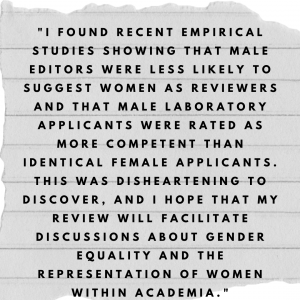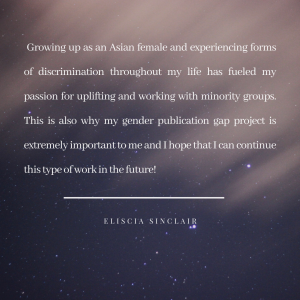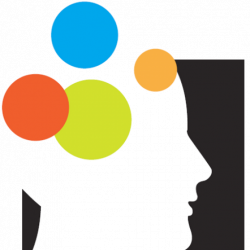By: Kevin Feng and Diana Kholmatova
Could you further summarize the research you are conducting for your gambling research lab projects?
I’m currently working on two projects at the Center for Gambling Research directed by Dr. Luke Clark. My first project is a review of the gender publication gap in gambling research and addiction science. The goal of the project is to evaluate the representation of women in the field of gambling, by using addiction science as a comparison point. It was inspired by Dr. Darko Odic’s paper investigating the gender publication gap in Psychology. My second project investigates ‘breaking-even’ in regular gamblers. We are looking at whether anything happens to decision making near the break-even point, or when the break-even point is reached. Breaking-even occurs when gamblers get back to their starting point within a gambling session. The break-even effect has been described as when decision makers are influenced by prior outcomes, and we want to see if there’s anything particular about people’s decision making when they are close to that point. For my third project, I am working with Dr. Dale Griffin and the Behavioural Decision Lab at the Sauder School of Business. We are collaborating with Dr. Clark, and are investigating how various factors including impulsivity, personality traits, and scores on the Problem Gambling Severity Index affect risk attitudes in problem gamblers.
Out of the projects, which one is your favorite? Why?
I love all of my projects, but I think the one that has taught me the most is the gender publication gap project. It is so different from my other projects and is very important to psychology as a whole.

What are some interesting findings and surprising results that you have found when reviewing the gender publication gap in gambling and addiction research?
We identified almost 5000 papers across eight different journals and our preliminary results indicate a larger gender gap for single author papers, and for last authorships. These preliminary findings follow the trend that there are more female researchers in the first author positions, but less female researchers who are single authors or in last author positions. In psychology, the last author position is often reserved for the Principal Investigator (PI) or the head of the lab. Since gambling is a multidisciplinary field that encompasses many areas like social work, law, public health, and medicine, we did not know whether the gender publication gap in gambling research would be similar to the patterns found in the field of Psychology. When I was doing my research, I found recent empirical studies showing that male editors were less likely to suggest women as reviewers and that male laboratory applicants were rated as more competent than identical female applicants. This was disheartening to discover, and I hope that my review will facilitate discussions about gender equality and the representation of women within academia.
Did you have to make any adjustments to your project due to COVID? Did the transition from in-person studies to online studies disrupt your research findings? How did you and your team overcome it?
My projects began in May of 2021, so the pandemic was really already in full swing. All of my work that summer was done remotely, and I didn’t go into the lab in-person until school started in September. Since the gender publication gap is not an experimental study, I was able to use various R-scripts and download all the data I needed to analyze from the databases I was using, like PubMed. Since the break-even study is an experimental study, Dr. Clark and my fellow lab members devised a new cognitive task that could be deployed online.
What was the most challenging part about doing multiple projects, and what did you learn from the challenge that you can apply to future research/life?
It’s been difficult managing all of my different projects that I have been involved in. It was definitely overwhelming this summer, I was working 35 hours a week in Dr. Clark’s lab and then 10 hours in Dr. Griffin’s lab. I love research, but it was a lot to manage at times! The most difficult part for me was definitely learning how to use R, I had no idea what to do. I did not even have R downloaded on my computer. Dr. Odic was kind enough to give me the scripts that he created for his analysis, which was really helpful. He also took time out of his day to explain to me how to use his scripts, etc. Using R was a big learning curve – because I had such a big project and needed to download lots of publications and data, it took a while and the code would often fail. There was a lot of trial and error. A lot of me just staring at my scripts and trying to figure out what was going on. That was definitely the hardest part – just trying to get all my scripts working and all my data downloaded!
What hard/soft skills have you developed from working on the research?
I have learned to develop strong time management and team working skills. Since I was working on so many different projects, time management was very important. I needed to make sure I allocated the correct amount of time to each project so all of them could get going. In fact, my Quinn Award (which funded my research with Dr. Clark this summer) was supposed to be focused on the breaking-even project. However, the gender publication project just fell into my lap. Dr. Clark and I really liked Dr. Odic’s paper and we were both interested in the gender publication gap. I also have to highlight that these projects would not have been possible without the help of all my mentors, and also fellow lab members. Like I mentioned, for our breaking-even project, my lab mate Sophie is the one who actually coded the project, because I did not know how to do that. So even though Dr. Clark and I came up with the study idea, she was the one that actually coded it and the only reason we are able to run it is because of her. In addition, my work with Dr. Griffin taught me how to code Qualtrics studies and use different functions like the randomizer, which I’d never done before. I gained a lot of hard and soft skills this past year, and learned that research encompasses so many different things. I think my projects really helped me become a better and more collaborative researcher. It was really cool working with all these different labs and I am excited to continue my research this year!
What are your other interests outside of Psychology? Are you a part of any clubs or teams?
I love working with kids! I’m currently volunteering with Mentoring the Stars, which is a nonprofit organization providing free tutoring to kids in BC. I think our organization has made a positive difference in the lives of British Columbians. We match volunteer university students with elementary, middle, and high school students. The pandemic severely affected education because kids were not in school, and I am really happy that our organization has made an impact in our community. We have had great feedback from families! I am also part of the UBC Mental Health Initiative, another student-run non-profit organization. I have volunteered as the Vice President of External Affairs for the past year and a half and work with an amazing team. I am very proud of the work we do, and this summer I helped develop an event focussing on mental health within the Asian community. Our goal is to improve mental health within the UBC and greater Vancouver community through action-based initiatives.

What are your professional goals and plans for the future? What do you see yourself doing in 5 years’ time? 10 years’ time?
My goal is to attend graduate school and pursue a PhD in Clinical Psychology. I hope that in the future, my career will involve both research and clinical practice. I also eventually want to work with diverse and underrepresented groups. Growing up as an Asian female and experiencing forms of discrimination throughout my life has fueled my passion for uplifting and working with minority groups. This is also why my gender publication gap project is extremely important to me and I hope that I can continue this type of work in the future!

